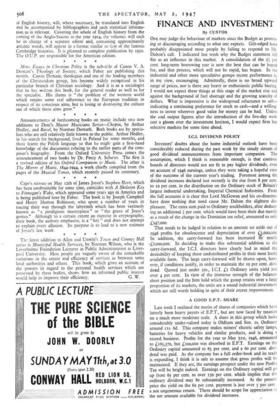FINANCE AND INVESTMENT
By CUSTOS
ONE may judge the behaviour of markets since the Budget as promis- ing or discouraging according to what one expects. Gilt-edged have probably disappointed most people by failing to respond to Mr. Dalton's call. I indicated last week why the Budget statement fell flat as an influence in this market. A consolidation of the 21 per cent. long-term borrowing rate is now the best that can be hoped for, and that process, which will not be rapid, has begun. In the industrial and other more speculative groups recent performance is, in my view, encouraging. Admittedly, there is no broad upward surge of prices, nor is there any heavy or enthusiastic public buying. I would not expect these things at this stage of the market rise and against the background of fuel shortage and the growing scarcity of dollars. What is impressive is the widespread reluctance to sell— indicating a continuing preference for stock to cash—and a willing- ness to invest wherever good value for money can be had. Unless the coal output figures after the introduction of the five-day week cast a gloom over the investment horizon, I would expect firm but selective markets for some time ahead.
I.C.I. DIVIDEND POLICY
Investors' doubts about the home industrial outlook have been considerably reduced during the past week by the steady stream of good dividend announcements from important companies. The assumption, which I think is reasonable enough, is that cautious boards of directors would not see fit to pay higher dividends, even on account of 1946 earnings, unless they were taking a hopeful view of the outcome of the current year's trading. Foremost among the dividend increases declared just recently is the rise from 8 per cent. to to per cent. in the distribution on the Ordinary stock of Britain's largest industrial undertaking, Imperial Chemical Industries. From the full accounts it is clear that Lord McGowan and his co-directors have done nothing that need cause Mr. Dalton the slightest dis- pleasure. The extra sum paid to Ordinary stockholders, after deduct- ing an additional 1 per cent. which would have been their due merely as a result of the change in the Dominion tax relief, amounted to only
£347,000-
That needs to be judged in relation to an amount set aside out of 1946 profits for obsolescence and depreciation of over 41,000,000. In addition, the carry-forward has been increased by nearly -£2,000,000. In deciding to make this substantial addition to the carry-forward, the I.C.I. directors have clearly had in mind the desirability of keeping these undistributed profits in their most freely available form. The large carry-forward will be drawn upon, how- ever, if conditions justify, in order to maintain the to per cent. divi- , dend. Quoted just under 5os., I.C.I. £t Ordinary units yield just over 4 per cent. In view of the immense strength of the balance- sheet position and the firm hold which the group retains over a large proportion of its markets, the units are a sound industrial investment which are still worth holding in spite of their recent improvement.
A GOOD E.P.T: SHARE
Last week I outlined the merits of shares of companies which have latterly been heavy payers of E.P.T., but are now faced by taxation on a much more moderate scale. A share in this group which looks considerably under-valued today is Oldham and Son. Is. Ordinary around x Is. 6d. This company makes miners' electric safety lamps, batteries for heavy vehicles and similar products, and is doing a record business. Profits for the year to May 31st, 1946, amounted to £165,370, but £100,000 was absorbed in E.P.T. Earnings on the Ordinary capital amounted to 65 per cent. and a 6o per cent. divi- dend was paid. As the company has a full order-book and its trade is expanding, I think it is safe to assume that gross profits will be maintained. If they are, the earnings prospect under the new Profits Tax will be bright indeed. Earnings on the Ordinary capital will go up from 65 per cent. to over 15o per cent. which implies that the ordinary dividend may be substantially increased. At the present price the yield on the 6o per cent. payment is just over 5 per cent a not ungenerous return. There should be scope for appreciation as the net amount available for dividend increases.


































 Previous page
Previous page